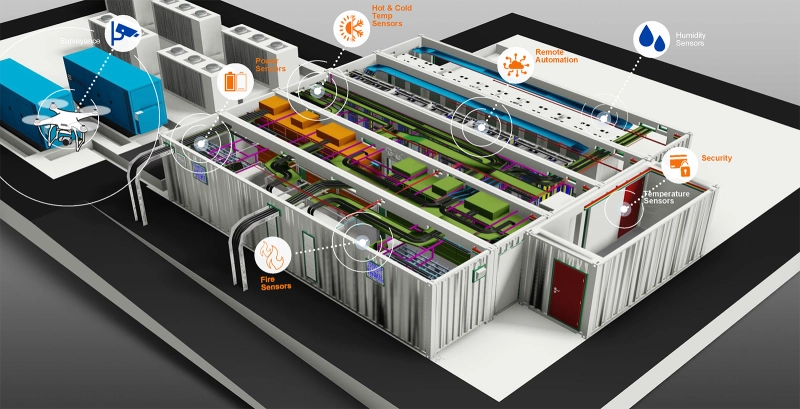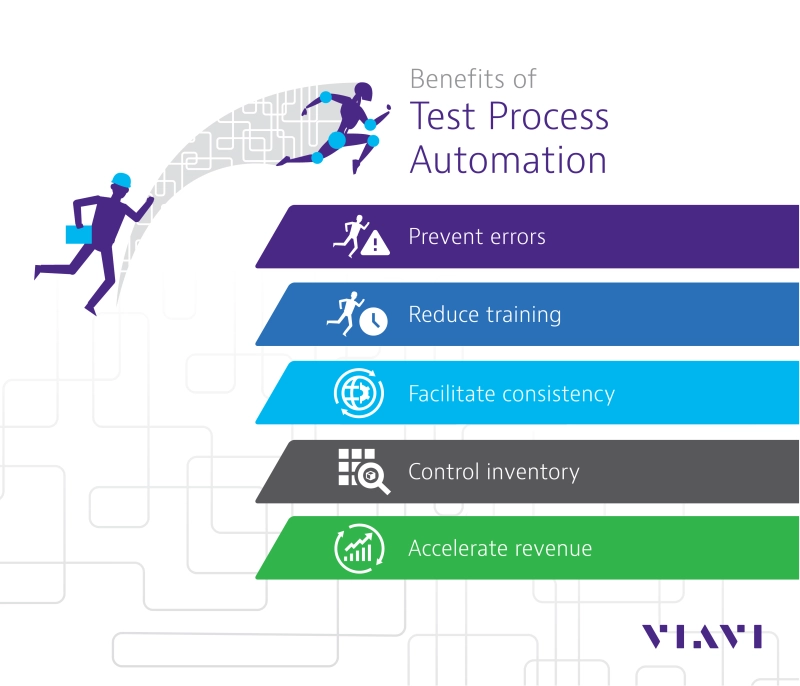What is Data Center Colocation?
Colocation data centers are a cost-effective outsourced solution for businesses of all types and sizes. We work with colocation providers and operators to maximize uptime, successfully scale services, and apply the latest test and monitoring innovations to optimize the customer experience.
Data center colocation is an IT business model where multiple clients rent floor/white space and/or equipment from a third-party provider to supplement their own data center needs. In some cases, an entire facility is leased to one client with the colocation operator providing ongoing monitoring, upgrades and maintenance.
Also referred to as a “colo”, a colocation data center allows smaller businesses with limited IT resources to cost-effectively scale computing power and storage.
What are Colocation Services?
Managed colocation services range from basic rack or floor space sub-leasing to full-service data center operation including application management, network performance monitoring, and data storage optimization. Typical colocation services also include:
- Power: Colocation data centers provide reliable, redundant power for their clients. Depending on the facility and tier, some will utilize uninterruptible power supplies (UPS) and battery backup systems to ensure a consistent power source is always available.
- Cooling: HVAC systems, chillers, and cooling towers are additional elements of colocation data center infrastructure that must be maintained to protect hardware and minimize costs. Inadequate cooling systems can lead to poor power efficiency usage (PUE) ratings, with the associated costs often passed on to clients.
- Security: Virtual and physical security services are offered by many colocation providers. Firewalls and security monitoring practices can protect customer data from cyberattacks. Physical security measures might include guards, around-the-clock video surveillance, and biometric access controls to protect each client’s designated space.

With new businesses emerging and existing companies expanding, third-party data centers can be a logical and expedient option. The benefits of using a colocation center include:
- Cost Reduction: Although ongoing leasing costs are incurred, colocation eliminates the construction, installation, and IT resources associated with an on-premises data center. As the needs of the business change over time, the colocation footprint and equipment can be adapted more easily.
- Performance: Colocation data center operators leverage economies of scale, updating infrastructure to deliver higher reliability and faster network speeds. Managed colocation services also provide the convenience of smart hands/remote hands acting on behalf of customers to optimize server and cabling performance.
- Redundancy: The power and cooling systems of a colocation center often include built-in redundancies to ensure close to 100% uptime. Advanced interconnection and storage methods support data redundancy, which improves security and recovery times. These levels of redundancy are usually not cost effective for small on-premises data centers.
- Portability: Colocation data center resources are often located close to manufacturing or transportation facilities to reduce latency, yet far enough away to improve physical security and reduce cost/square foot. A data center model based on a flexible customer base also makes it easier to move resources from one location to another.
According to IDC, a hyperscale data cente utilizes at least 5,000 servers and 10,000 square feet of floor space, although many centers are significantly larger. Beyond these capacity thresholds, hyperscale also defines a flexible data center architecture that utilizes software-defined networking (SDN) and specialized load balancing to scale resources quickly.
Although colocation data centers can reach hyperscale proportions, and hyperscale operators might lease resources to multiple clients, there are important differences between the two concepts:
- A colocation data center will lease floor space and computing services to companies of all types and sizes, whereas a hyperscale data center will be occupied only by large organizations like internet content providers (ICPs) and telecommunications companies.
- Hyperscale data center occupants might require thousands of servers to meet their data analytics and storage needs, often consuming over 50 megawatts of power in one deployment.
- Best-in-class servers, virtual networking capabilities, and remote automation and sensing technologies support hyperscale performance and reliability. This makes it impractical to lease floor or rack space to customers providing their own legacy hardware and cabling.

Data center tiers are based on a standardized ranking system created by the Uptime Institute. Each colocation data center receives a classification ranging from level 1-4 based on factors like fault tolerance and uptime guarantees, with level 4 bestowed on only the highest performing data centers.
- Tier 1: This level of performance indicates minimal infrastructure and redundancy, although a UPS and generator to mitigate power outages are required. As an affordable option for smaller customers, Tier 1 data centers guarantee 99.671% uptime.
- Tier 2: With a single path for power and cooling, a Tier 2 colocation data center offers levels of redundancy suitable for many small-medium sized businesses (SMBs). Guaranteed uptime of 99.741% equates to less than 22 hours of allowable downtime per year.
- Tier 3: This intermediate level offers a solid compromise between performance and reliability for larger colocation customers. Tier 3 data centers provide first shift staffing, a 99.982% uptime rating, and the capacity to operate for at least 72 hours after a power outage.
- Tier 4: Hyperscale data centers are among the recipients of this high-performance rating, with 24/7 staffing, redundancy for every component, and at least 99.995% uptime. This translates to a maximum downtime of just 25 minutes per year.
Types of Colocation Facilities
Beyond the performance-based tier classification, colocation data centers are distinguished by size, available services, and location. As the industry has evolved, three distinct categories of colocation facilities have emerged:
- Retail Colocation
This colocation center category is suitable for small businesses operating on shorter leases. Space is shared with other customers renting up to one standard rack (42 units) of colocation space. Retail colocation works best for customers with a limited amount of data who do not plan on expanding significantly. - Wholesale Colocation
Tenants in the wholesale colocation category rent out entire data centers or private suites for long-term occupancy. This option offers a higher level of security since data storage is segregated from other clients. Wholesale colocation also provides more opportunities for customization and expansion. - Hybrid Cloud Colocation
A third option combines retail and colocation cloud models to increase overall computing power and scalability from a smaller footprint. The client sets up an on-premises data center or retail colocation space with cloud interoperability so that external cloud applications and services can be used to scale capabilities on demand.
Although colocation and cloud both fulfill specific computing, security, and capacity needs for customers leveraging external resources, they are two very different concepts:
- Cloud computing is defined as on-demand access to applications, data storage, development tools, and networking capabilities over the internet.
- Colocation is defined by shared access to physical space, hardware, and infrastructure. A colocation facility does not create or update client applications.
- Cloud data center resources are managed by a cloud service provider (CSP) who grants access to users based on subscription or usage-based fees.
- Colocation resources are managed by the leasing client who pays for ongoing access to infrastructure rather than computing capabilities.
- Cloud resources including computing and storage capacity are highly scalable due to the virtualized architecture.
- Colocation data center capacity, especially for Tier 1-3 data centers, is essentially fixed based on the physical limitations of the leased floor/rack space.

Data centers rely on flawless hardware, software, and fiber link performance to ensure SLAs are met and customer satisfaction is assured. At the same time, the trend towards “lights out” operation can leave colocation cloud providers with limited options for ongoing verification. Innovative VIAVI test solutions have brought automated workflows and ease-of-use to a suite of handheld test and monitoring solutions for fiber certification, network monitoring, and real-time reporting.
- Fiber Certification and Troubleshooting: As colocation data centers are configured and updated, efficient fiber inspection is essential to prevent compromised throughput. Tier 1 fiber certification verifies the integrity and polarity of fiber links while tier 2 certification uses advanced, automated VIAVI OTDR testing to pinpoint the location and cause of any excessive optical element loss and optical return loss.
- Network Observability: Innovative test solutions ensure that lights out operation does not compromise network or fiber monitoring integrity. The FTH-5000 fiber monitoring solution requires no IT configuration and provides instant alerts when performance degradation is detected. The MAP-2100 solution enables colocation data center operators and service providers to run high-performance bit error rate tests, especially for unmanned locations.
Test Process Automation: Colocation data center performance, reliability, and test process efficiency are vastly improved through the implementation of test process automation (TPA). We partner with our customers to establish automated workflows for fiber inspection, certification, and network troubleshooting that accelerate test and reporting cycles, reduce training requirements, and improve alignment between technicians and customers.

Cost reduction is a primary motivation for colocation customers. Pricing models and plans for managed colocation services continue to evolve along with the available options and hosting methods. The factors included in data center pricing include:
- Rack/floor space: Floor space (or rack space) is an elemental pricing factor for a colocation center, and among the easiest to quantify. In a retail data center, customers will typically lease all or part of a full-sized 42U rack.
- Internet Service: Internet connectivity is a given for transporting data between the data center and other network locations/users. The speed and bandwidth of this service will depend on the customer requirements and will influence the cost.
- Power Consumption: The energy required to power IT equipment is the highest variable expenditure for the colocation data center provider. Redundant power sources add to this burden, with higher data center tiers linked to higher OPEX passed on to clients.
- Support: The level of support can be customized for clients seeking to outsource equipment monitoring and maintenance functions. Smart hands and remote hands are additional support services that can be priced on as as-needed (rather than fixed) basis.
The "Colo" Market
The global data center colocation market is expected to exceed $200 billion by 2030, as data center occupants seek out flexible and reliable options to ramp up or relocate network capacity. Maintaining a competitive edge in this emerging market requires a dedication to testing, monitoring, and security throughout the data center lifecycle.
As the ecosystem expands, we partner with data center operators and service providers to meet the demanding uptime, performance (throughput and latency), and data integrity requirements of colocation data centers. Our commitment to innovation and ongoing collaboration with customers and standards bodies have combined to yield the industry’s most comprehensive data center testing toolkit and automation solutions.
